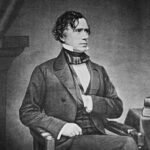The Historic Perry Expedition Results
The Perry Expedition Results marked a pivotal moment in 19th-century diplomacy. Commodore Matthew Perry’s mission culminated in the Treaty of Kanagawa on March 31, 1854. This agreement opened two Japanese ports to American vessels for the first time in over 200 years. 📊 The treaty established fuel and supply stations for American ships crossing the Pacific Ocean.
Breaking Japan’s Isolation Policy
Japan had maintained strict isolationist policies since 1633 under the Tokugawa shogunate. The sakoku policy prohibited foreign trade and contact with Western nations. Perry’s diplomatic pressure through “gunboat diplomacy” convinced Japanese leaders to reconsider their position. 💰 The economic potential of Pacific trade routes motivated Pierce’s administration to pursue this breakthrough.
Strategic Diplomatic Achievement
Pierce’s team negotiated carefully to respect Japanese customs while securing American interests. The treaty included provisions for humane treatment of shipwrecked sailors. It also established a U.S. consul in Japan within 18 months. This diplomatic success demonstrated America’s growing influence in Pacific affairs and international commerce expansion.
Impact:
Immediate Economic Transformation
The Perry Expedition Results created unprecedented opportunities for American merchants and traders. 💰 Pacific trade routes became viable for the first time since the California Gold Rush increased Western commerce. American whaling ships gained crucial refueling stations in Japanese waters. The agreement reduced voyage costs and improved safety for trans-Pacific journeys.
Global Diplomatic Consequences
Japan’s opening triggered a cascade of international treaties with European powers. 🌍 Britain, Russia, and the Netherlands quickly secured similar agreements following America’s success. The Treaty of Kanagawa demonstrated that isolationist policies could not withstand modern diplomatic and economic pressures. This precedent influenced other closed societies worldwide.
Long-term Historical Significance
The Perry Expedition Results fundamentally altered East-West relations for generations. Japan’s rapid modernization during the Meiji Restoration stemmed partly from this initial opening. 🔥 The treaty established America as a major Pacific power decades before acquiring Hawaii or the Philippines. However, the forced nature of this agreement also created long-term tensions. These diplomatic methods would later influence American foreign policy throughout Asia and contribute to complex U.S.-Japan relations leading into the 20th century.
